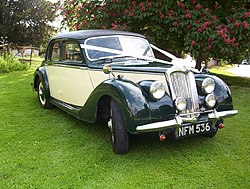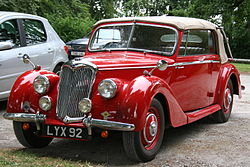Riley RM
| |||||||||||||||||||||
| |||||||||||||||||||||
| |||||||||||||||||||||
| |||||||||||||||||||||
| |||||||||||||||||||||
| |||||||||||||||||||||
|
There were three types of RM vehicles produced: The RMA was a large saloon, and was replaced by the RME. The RMB was an even larger car, and was replaced by the RMF. The RMC and RMD were limited-production roadsters. Allof the RM vehicles featured the pre-war Riley designed 1.5 L (1496 cc) 12 hp (8.9 kW) or 16 hp (11.9 kW) 2.5 L "Big Four" straight-4 engines with twin camshafts mounted high at the sides of the cylinder block and hemispherical combustion chambers. Riley RMAThe RMA was the first post-war Riley. It used the 1.5 L engine and was equipped with hydro-mechanical brakes and an independent suspension using torsion bars in front. The frame was made of wood in the English tradition, and the car featured traditional styling. The car was capable of reaching 75 mph. The RMA was produced from 1945 until 1952 when it was replaced by the RME. Riley RMBThe RMB was an enlarged RMA and was launched a year later in 1945. It used the 2.5 L (2443 cc) "Big Four" engine with twin SU carburettors, starting with 90 hp (67 kW) but increasing to 100 hp (75 kW) for 1948 with a 95 mph top speed. The RMB was replaced by the RMF for 1952. Riley RMCThe RMC was a 3-passenger 2-door convertible version of the RMB. It shared that car's 2.5 L 100 hp (75 kW) engine and could reach 100 mph (161 km/h). The car was designed for American export, and just over 500 were built from 1948 until 1951. Riley RMDThe RMD was a traditional 2-door drophead coupe, the last convertible to wear the Riley name. It used the same 2.5 L 100 hp (75 kW) engine as the RMB, on which it was based. Just over 500 were produced between 1949 and 1951. Riley RMEThe RME was an updated RMA. It still used the 1.5 L four and featured a fully-hydraulic braking system. The body had an enlarged rear window and from 1954 no running boards. Produced from 1952, it was replaced by the Riley One-Point-Five in 1955. Riley RMFThe RMF replaced the big RMB limousine in 1952. It shared that car's 2.5 L "Big Four" engine as well as the mechanical updates from the RME. The Riley Pathfinder took its place after 1953. References
|
||||||||||||||||||||



